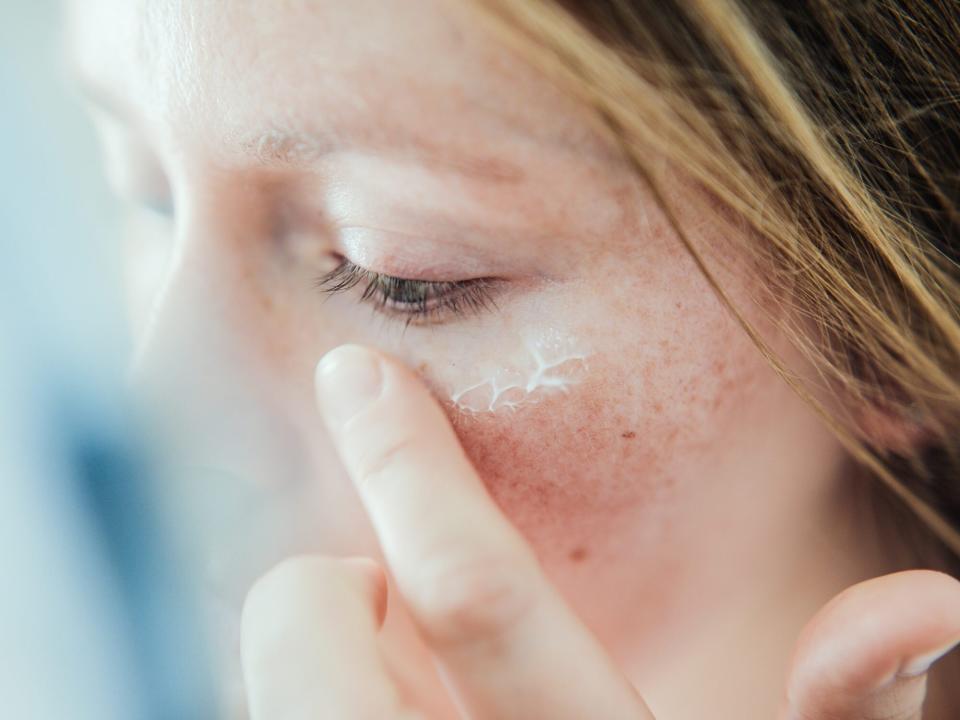Ceramides Are the Unsung Heroes for Irritated Skin that Experts Want You to Use
When your complexion seems to stay irritated no matter what, the problem could lie within your skin's barrier. The barrier is the outermost layer of your skin, which comes in contact with all of the elements. It prevents moisture and water from escaping, though depending on the environment and how aggressive you are with exfoliating treatments, it gets exposed to a lot of external aggressors. However, by incorporating more ceramides into your skincare regime, you can simultaneously repair that barrier and reduce inflammation.
According to Laurel Geraghty, MD, of Dermatology & Laser Associates, ceramides are fatty molecules naturally found within the skin—and they're the key to maintaining a healthy skin barrier and keeping the complexion protected against the outside world.
"Ceramides help to seal and trap hydration within the skin," she explains. "Even though the outer layers of skin naturally contain ceramides, our complexion can still become dry, sensitive, and irritated when exposed to cold or dry air, irritating products, harsh cleansers, sun, and other factors."
While some of these triggering factors can be avoided, the effects of all of them can be mitigated by embracing a ceramide-rich skincare routine. "We can help to restore our skin's hydration from the outside by choosing gentle cleansers and applying rich, hypoallergenic creams containing ceramides and other highly moisturizing ingredients," Dr. Geraghty says.

Getty Images
RELATED: Hyaluronic Acid is the Anti-Aging Ingredient You Need For Glowing Skin
Although ceramides naturally occur within the skin, such as collagen and elastin, the production of the vital fatty molecules slows with age. That's why incorporating topical ceramides into your skincare routine is so important. "They can give a boost of hydration, make the skin feel softer and more supple, reinforce the skin's natural barrier, soothe itch and irritation, and calm rashes," Dr. Geraghty says. "They can even help improve the appearance of fine lines and wrinkles temporarily."
All skin types can benefit from topical ceramides, however, according to Blair Murphy-Rose, MD, a Manhattan-based board-certified dermatologist, people with extremely sensitive skin benefit the most. "Those with eczema usually have a diminished skin barrier with insufficient ceramide levels," she explains, noting that topical ceramides can be a godsend for strengthening the skin barrier and improving the overall look and feel of the skin.
Additionally, dermatologist Anthony Rossi, MD, points out that eczema isn't the only skin condition affected by a diminished barrier function (rosacea and acne can be, too), which is the direct result of a decrease in ceramide concentration. With that in mind, he says that if your skin is particularly irritated, it's likely time to turn your attention to products containing ceramides as they can often fill the void and improve the complexion situation.
RELATED: The Best Anti-Inflammatory Ingredients for Irritated Skin
The skin below your face, neck, and chest is just as in need of ceramides, so be sure not to overlook body lotions and creams. "I have naturally dry, sensitive, combination skin, and if I use something harsh or irritating, my skin is going to suffer from it," Dr. Geraghty shares. "As a dermatologist, I don't have time for redness, rashes, breakouts, or blotchiness, so I typically maintain my skin's softness and hydration with Cetaphil Intensive Healing Lotion ($19.99, amazon.com), which contains ceramides, sunflower seed oil, and a blend of other skin-soothing ingredients."
If you're specifically looking to care for your face, there are several options. For anti-aging benefits, Hadley King, MD, a Manhattan-based dermatologist recommends POND'S Rejuveness Advanced Hydrating Night Cream ($7.99, target.com) as it's formulated with vitamin B3 and retinol complex as well as glycerin and pro-ceramides to hydrate and support the skin barrier. For super-dry skin, look no further than the Skinceuticals Triple Lipid Restore ($130, dermstore.com). "Containing ceramides, cholesterol, and fatty acids, this rich face cream is a perfect fix for extra dry or irritated skin," Dr. Murphy-Rose says. "Dry, flaky skin immediately appears smoother and more hydrated upon application." Lastly, if you're looking for an everyday ceramide-rich cream, Dr. King recommends CeraVe's AM Facial Moisturizing Lotion with SPF 30 ($15.19, ulta.com). "It contains hyaluronic acid, which is a powerful humectant for hydrating the skin, as well as ceramides to lock in that moisture and restore and protect the skin barrier," Dr. King says. "And it contains niacinamide, a derivative of vitamin B3, that has anti-inflammatory properties and helps protect the skin from infrared heat and helps prevent discolorations."
Unlike some ingredients, such as exfoliants, there is no limit to how often you can apply ceramides thanks to how gentle and hydrating they are. That said, Dr. Geraghty says that for normal skin types, once a day is usually sufficient to keep the skin hydrated and soft. "For dry, sensitive, or rash-prone skin types like me, twice a day is even better," she adds, noting that moisturizers containing ceramides are not something to skimp on. "More is more!"
Frequency aside, you also don't have to worry about which ingredients you mix ceramides with. "If you take any potentially irritating ingredient in a skincare product and combine it with ceramides, your skin is likely to tolerate the ingredient better," Dr. Geraghty shares. "Ceramides help make potentially harsh or irritating ingredients much more tolerable—like retinoids (like retinol), alpha hydroxy acids, and beta hydroxy acids."

